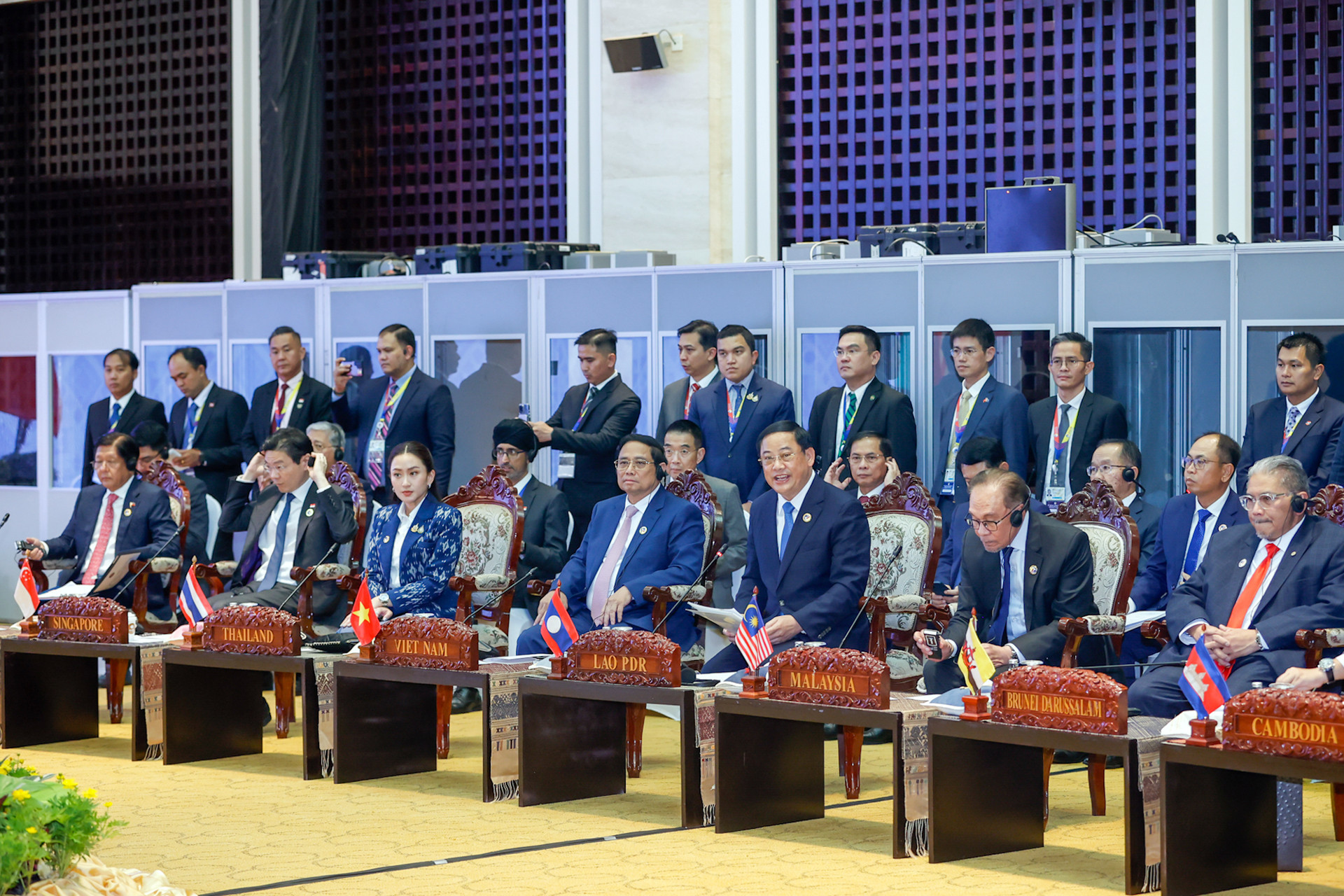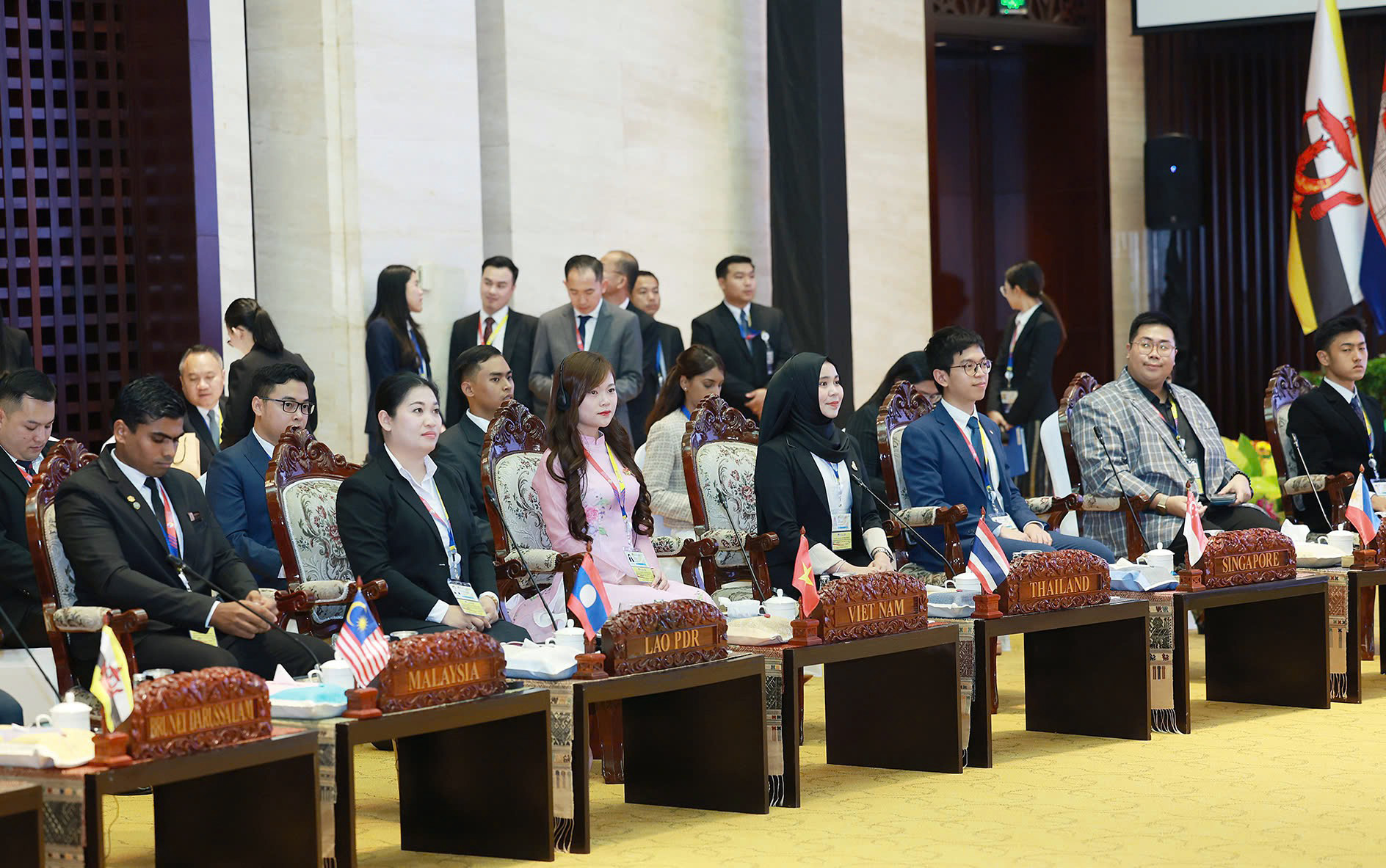On the afternoon of October 9, during the 44th and 45th ASEAN Summits and related meetings, Prime Minister Pham Minh Chinh, along with leaders from ASEAN countries, participated in a dialogue session with representatives from the ASEAN Inter-Parliamentary Assembly (AIPA), the ASEAN Business Advisory Council (ASEAN-BAC), and ASEAN Youth.

Member parliaments of AIPA affirmed that ASEAN and AIPA need to strengthen coordination, enhancing their roles in leading cooperation processes in the region.
In this spirit, member parliaments proposed to increase dialogue and collaboration between governments and parliaments in building the community, concretizing ASEAN's commitments through legal frameworks, and facilitating economic growth while expanding cooperation in emerging sectors such as digital economy, clean energy, and innovation.
Governments and parliaments need to continue working together to promote ASEAN's central role in maintaining peace and stability in the region, enhancing practical cooperation between ASEAN and its partners, upholding ASEAN principles and norms of conduct, and adhering to international law, including the 1982 United Nations Convention on the Law of the Sea (UNCLOS).

ASEAN-BAC representatives shared that ASEAN has significant potential for growth and leadership in new industries such as semiconductors, participating more deeply in the global semiconductor value chain.
In this regard, ASEAN-BAC recommended enhancing public-private partnerships, encouraging investment in research and development, especially in artificial intelligence, removing barriers to trade and investment, and strengthening intellectual property protection.
Representatives of ASEAN youth expressed their desire to participate and contribute to the community-building process, nurturing and promoting a sense of civic responsibility among young people. Young enterprises in ASEAN can play a pioneering role, bringing new and breakthrough ideas to the community, region, and the world.
Emphasizing the role of education and training in the current context, youth representatives called on leaders to continue focusing on developing and implementing quality, comprehensive education and training programs that ensure access for all.
Speaking at the dialogue sessions, Prime Minister Pham Minh Chinh praised the participation of member parliaments, businesses, and youth, contributing to the implementation of ASEAN's priorities and focus areas.
According to the Prime Minister, strengthening ASEAN solidarity is an objective requirement, a strategic choice, and a top priority. It is necessary to enhance ASEAN's adaptability to major global challenges, such as war and peace, climate change, resource depletion, and an aging population.
Welcoming this year’s AIPA theme on "The Role of Parliaments in Enhancing Connectivity and Inclusive Growth in ASEAN," which complements and aligns with ASEAN’s theme of "Promoting Connectivity and Self-Reliance," the Prime Minister suggested that countries need to set specific orientations and take decisive actions toward building a connected, self-reliant, sustainable, and inclusive ASEAN Community.

Highlighting that institutions are both a driving force and a resource for rapid and sustainable development, the Prime Minister urged member parliaments to unite and support each other in building institutions that contribute to ensuring resilience, connectivity, and inclusiveness in development.
Expressing satisfaction with the region's economic achievements, the Prime Minister recognized the contributions of the business community and welcomed the topic of "Digital Trade Connectivity" for 2025 from ASEAN-BAC Chair Malaysia.
The Prime Minister suggested that ASEAN-BAC enhance its participation in addressing major regional issues such as climate change, the environment, an aging population, and resource depletion while promoting cooperation in developing the digital economy and green economy.
Strengthening connections between government and business, the Prime Minister emphasized that businesses need to play a pioneering and innovative role, consulting the government on obstacles and issues related to institutions, infrastructure, and human resources, helping to create a favorable business investment environment and opening up opportunities for businesses to contribute more to regional and national development.
Reaffirming the importance of business connectivity, the Prime Minister called for enhanced mobilization of resources through public-private partnerships, technology transfer, smart governance connections, and supporting human resource training.
Prime Minister Pham Minh Chinh stressed the role of businesses in ensuring social welfare, contributing to the goal of leaving no one behind. Sharing Vietnam's efforts in this area, he affirmed that there will be no sacrifice of social equity and environmental sustainability for mere economic growth. A sustainable and inclusive ASEAN cannot be achieved without the role and contributions of businesses.
During the dialogue with youth, Vietnam and other countries emphasized that youth are a powerful force, a valuable asset, and a beacon of hope for the region's future. The document from the United Nations Future Summit in September also emphasized that "meaningful, effective, safe, and full participation of youth is essential to maintaining and promoting international peace and security.”
Quang Phong